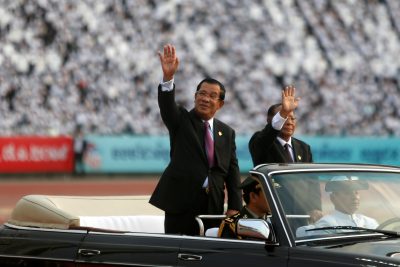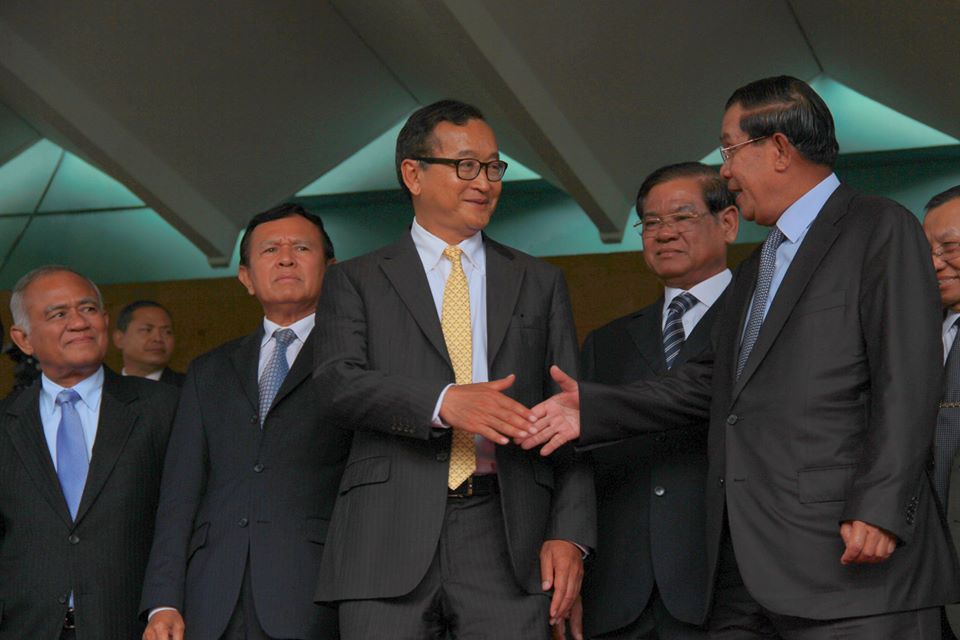Reversing Cambodia’s democratic drift
Op-Ed: East Asia Forum
14 February 2019
One viable approach to halting the degeneration of Cambodia’s ersatz democracy is to engage in channels of dialogue at both national and international levels. At the national level, it is imperative to resume the culture of dialogue between the ruling CPP and the dissolved CNRP.
ដំណោះស្រាយទៅបានដោយរលូនមួយដើម្បីទប់ស្កាត់ការលូតលាស់នៃប្រជាធិបតេយ្យគ្រាន់តែជាត្រីមុខរបស់កម្ពុជាគឺការបន្តជជែកគ្នានៅគ្រប់កំរិតថ្នាក់ទាំងអស់ ទាំងថ្នាក់ជាតិនិងអន្តរជាតិ។ នៅថ្នាក់ជាតិ វាសំខាន់ចាំបាច់ដើម្បីសើរើវប្បធម៍សន្ទនារវាងគណបក្សប្រជាជនគ្រប់គ្រងអំណាចនិងគណបក្សសង្គ្រោះជាតិដែលត្រូវបានរំលាយ។ ការសន្ទនាកំរិតអន្តរជាតិទាមទារការចូលរួមនិងការសហការពីតួអង្គខាងក្រៅសំខាន់ៗដែលមានអានុភាពពិសេសទៅលើទិដ្ឋភាពសេដ្ឋកិច្ចនិងនយោបាយកម្ពុជា មានដូចជាសហរដ្ឋអាមេរិក សហគមអុឺរ៉ុប និងចិន។ តួអង្គដ៏ទៃទៀតដូចជាអូស្ត្រាលី ជប៉ុន និងអាស៊ានក៏ជាតួអង្គសំខាន់ផងដែរ។ តាមរយៈនីតិវិធីនៃការពិភាក្សានិងចរចារទាំងនេះ ទិសដៅនៃលទ្ធិប្រជាធិបតេយ្យរបស់កម្ពុជា ដែលមនុស្សភាគច្រើនយល់ថាកំពុងធ្លាក់ទៅក្នុងរបបផ្តាច់ការ អាចនឹងត្រូវបានរស់រានឡើងវិញ។
Dialogue at the international level requires participation and coordination from key external players that have significant leverage over Cambodia’s political and economic landscape, such as the United States, the European Union and China. Other players like Australia, Japan and ASEAN are also important.
Through these channels of discussion and negotiation the course of Cambodia’s democracy, perceived by many as a drift towards autocratic rule, can be reversed.
Authors: Kimkong Heng, University of Queensland and Veasna Var, UNSW Canberra
Cambodia is drifting towards autocracy with a clear trend. An unprecedented crackdown on independent media, civil society and the country’s major opposition party, the Cambodia National Rescue Party (CNRP), hardly suggest otherwise. Whether Hun Sen’s government likes it or not, similar observations about Cambodia will continue to emerge.

Although 19 smaller parties participated in the July 2018 national elections, commentators and observers questioned the credibility of the election. Some called it a sham. Prime Minister Hun Sen’s ruling Cambodian People’s Party (CPP) was unchallenged in the election, allowing the CPP to secure a predictable landslide victory. The party won all 125 parliamentary seats.
Hun Sen’s recent political moves have not gone unnoticed. The United States has placed sanctions on high-ranking Cambodian government officials. The European Union has begun a formal procedure to withdraw its Everything But Arms (EBA) trade preferences. And the Australian and Japanese governments have raised concerns over the dissolution of the main opposition party.
Now, as international pressure mounts, Cambodia’s political tensions seem to be easing. In December 2018 the Cambodian National Assembly amended the Law on Political Parties, paving the way for the 118 banned CNRP politicians to return to politics.
It remains to be seen whether all CNRP officials will request political rehabilitation. So far, only two have. If this trend continues, a division within the opposition between supporters of acting CNRP President Sam Rainsy and former CNRP president Kem Sokha, who was arrested in 2017 prior to the party’s dissolution, may become more severe and lead to a split.
Sam Rainsy, who lives in self-imposed exile, recently announced that he would return to Cambodia this year to fight for change and democracy. He even challenged Hun Sen to a bet over the likelihood of Kem Sokha’s release amid mounting international pressure. He faces imprisonment if he loses, but if he wins Hun Sen has agreed to step down from power.

The high-stakes wager reflects the country’s political dysfunction and could result in a lose-lose situation for both prominent Cambodian political figures. Hun Sen may come under more criticism and Sam Rainsy could further damage his already compromised integrity if they fail to stick to the terms of their political wager. As it stands, it seems likely that Sam Rainsy will try to take advantage of the situation to return to Cambodia, resume his political career and put more pressure on Hun Sen’s government.
The direction of Cambodia’s political development remains unclear amid talk of Sam Rainsy’s return and the possibility of senior CNRP officials returning to politics. Despite this uncertainty, Prime Minister Hun Sen and his ruling elites hold the key to relieving the political deadlock and putting the deteriorating democracy back on track.
Continue reading